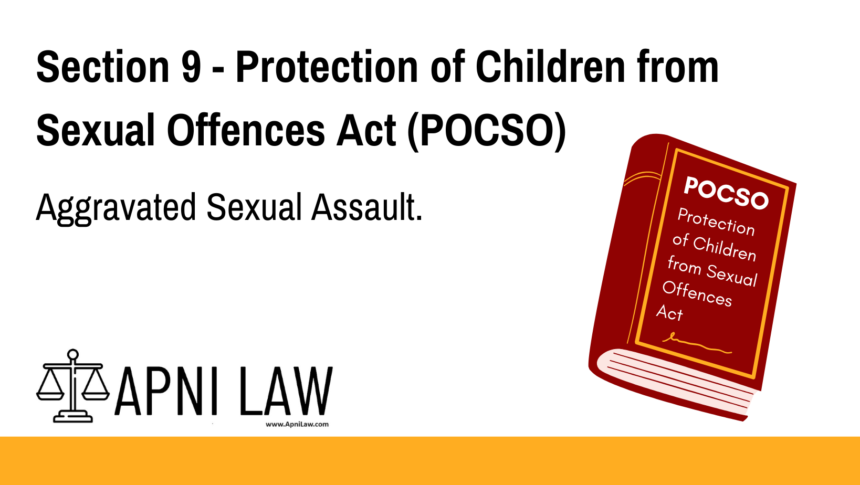Code: Section 9 POCSO Act
(a) Whoever, being a police officer, commits sexual assault on a child—
(i) within the limits of the police station or premises where he is appointed; or
(ii) in the premises of any station house whether or not situated in the police station to which he is appointed; or
(iii) in the course of his duties or otherwise; or
(iv) where he is known as, or identified as a police officer; or
(b) whoever, being a member of the armed forces or security forces, commits sexual assault on a child—
(i) within the limits of the area to which the person is deployed; or
(ii) in any areas under the command of the security or armed forces; or
(iii) in the course of his duties or otherwise; or
(iv) where he is known or identified as a member of the security or armed forces; or
(c) whoever being a public servant commits sexual assault on a child; or
(d) whoever being on the management or on the staff of a jail, or remand home or protection home or observation home, or other place of custody or care and protection established by or under any law for the time being in force commits sexual assault on a child being inmate of such jail or remand home or protection home or observation home or other place of custody or care and protection; or
(e) whoever being on the management or staff of a hospital, whether Government or private, commits sexual assault on a child in that hospital; or
(f) whoever being on the management or staff of an educational institution or religious institution, commits sexual assault on a child in that institution; or
(g) whoever commits gang sexual assault on a child.
Explanation.—when a child is subjected to sexual assault by one or more persons of a group in furtherance of their common intention, each of such persons shall be deemed to have committed gang sexual assault within the meaning of this clause and each of such person shall be liable for that act in the same manner as if it were done by him alone; or
(h) whoever commits sexual assault on a child using deadly weapons, fire, heated substance or corrosive substance; or
(i) whoever commits sexual assault causing grievous hurt or causing bodily harm and injury or injury to the sexual organs of the child; or
(j) whoever commits sexual assault on a child, which—
(i) physically incapacitates the child or causes the child to become mentally ill as defined under clause (l) of section 2of the Mental Health Act, 1987 (14 of 1987) or causes impairment of any kind so as to render the child unable to perform regular tasks, temporarily or permanently; or
(ii) inflicts the child with Human Immunodeficiency Virus or any other life threatening disease or infection which may either temporarily or permanently impair the child by rendering him physically incapacitated, or mentally ill to perform regular tasks; or
(k) whoever, taking advantage of a child’s mental or physical disability, commits sexual assault on the child; or
(l) whoever commits sexual assault on the child more than once or repeatedly; or
(m) whoever commits sexual assault on a child below twelve years; or
(n) whoever, being a relative of the child through blood or adoption or marriage or guardianship or in foster care, or having domestic relationship with a parent of the child, or who is living in the same or shared household with the child, commits sexual assault on such child; or
(o) whoever, being in the ownership or management or staff, of any institution providing services to the child, commits sexual assault on the child in such institution; or
(p) whoever, being in a position of trust or authority of a child, commits sexual assault on the child in an institution or home of the child or anywhere else; or
(q) whoever commits sexual assault on a child knowing the child is pregnant; or
(r) whoever commits sexual assault on a child and attempts to murder the child; or
(s) whoever commits sexual assault on a child in the course of communal or sectarian violence or during any natural calamity or in any similar situations; or
(t) whoever commits sexual assault on a child and who has been previously convicted of having committed any offence under this Act or any sexual offence punishable under any other law for the time being in force; or
(u) whoever commits sexual assault on a child and makes the child to strip or parade naked in public;
(v) whoever persuades, induces, entices or coerces a child to get administered or administers or direct anyone to administer, help in getting administered any drug or hormone or any chemical substance, to a child with the intent that such child attains early sexual maturity,
is said to commit aggravated sexual assault.
Explanation of Section 9 POCSO
Section 9 of the Protection of Children from Sexual Offences Act (POCSO) defines aggravated sexual assault as a more serious form of sexual assault, where the perpetrator’s position, actions, or the nature of the assault makes the crime more severe. This section lists a variety of scenarios where sexual assault on a child is considered aggravated due to the identity of the perpetrator or the circumstances of the offense.
Key Provisions Under Section 9:
- Aggravating Factors: The offense is aggravated if committed by certain categories of people, such as:
- Police officers
- Members of the armed forces or security forces
- Public servants
- Personnel in places of custody like jails or protection homes
- Hospital staff, educational or religious institution staff
- Seriousness of the Offense: Aggravating factors include the use of deadly weapons, infliction of grievous hurt, repeated offenses, and committing the offense against children under 12 years of age.
- Gang Sexual Assault: When multiple individuals commit sexual assault on a child in furtherance of a common intention, each individual is considered to have committed the offense individually.
- Exploitation of Vulnerabilities: The law considers aggravation in cases where the perpetrator exploits the child’s disability, pregnancy, or attempts to induce early sexual maturity.
- Special Situations: Crimes committed during communal violence, natural calamities, or similar extreme situations are also covered under this section.
The purpose of this section is to ensure that those in positions of authority, trust, or power who abuse their position to sexually assault children are held accountable and face more severe punishments.
Illustration
Example 1: Sexual Assault by a Police Officer
A police officer sexually assaults a child within the precincts of the police station. This act is categorized as aggravated sexual assault under Section 9 due to the position of the perpetrator.
Example 2: Gang Sexual Assault
A group of individuals sexually assaults a child together. Each of the offenders is considered to have committed aggravated sexual assault, and they are held liable in the same manner as if they had committed the crime individually.
Example 3: Sexual Assault Using Deadly Weapons
An individual sexually assaults a child while threatening them with a weapon. The use of a deadly weapon makes the offense aggravated sexual assault under Section 9.
Common Questions & Answers on Section 9 POCSO
1. What makes sexual assault “aggravated” under Section 9?
- Aggravated sexual assault involves factors such as the identity of the offender (e.g., police officer, armed forces member, etc.), the use of deadly weapons, or the infliction of grievous harm. It also covers offenses like repeated sexual assault or assault on children below 12 years.
2. Does the law provide harsher punishment for aggravated sexual assault?
- Yes, aggravated sexual assault is considered a more serious offense and leads to stricter punishments, including longer prison sentences and higher fines.
3. Can a person be charged with aggravated sexual assault even if they didn’t physically commit the crime?
- Yes, if a person is part of a group that sexually assaults a child (gang sexual assault), they are all considered equally responsible and can be charged with aggravated sexual assault.
4. Are there any specific aggravating factors related to the child’s condition?
- Yes, aggravated sexual assault applies when the perpetrator takes advantage of a child’s physical or mental disability or incapacitates them permanently or temporarily.
Conclusion
Section 9 of the Protection of Children from Sexual Offences Act (POCSO) ensures that sexual assault on a child is treated with the utmost seriousness, especially when aggravating factors such as the identity of the offender, the use of weapons, or repeated offenses are involved. It establishes strict penalties for individuals who exploit their position or abuse their power to commit these heinous acts.
For further information and legal insights, visit ApniLaw.








